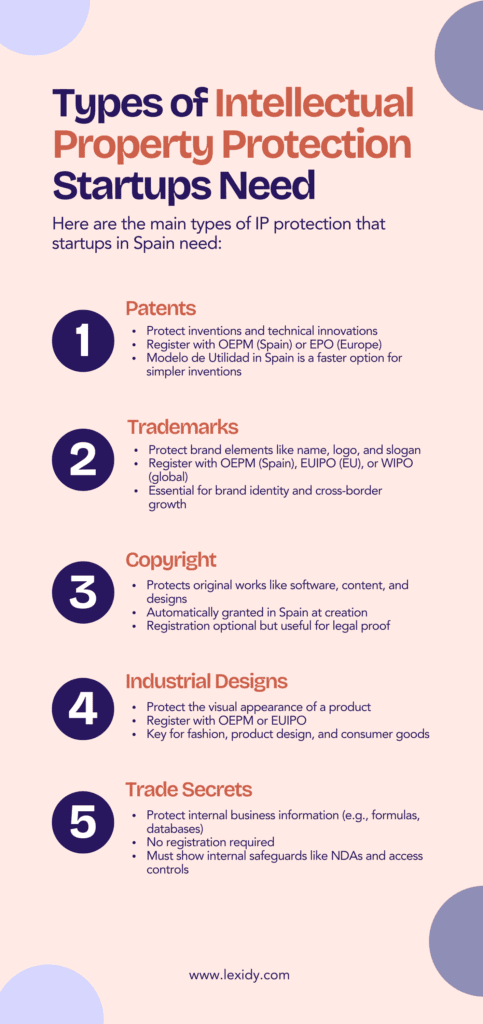You’ve got the product. You’ve got the traction. But do you have a plan to protect what makes your startup valuable? When starting or scaling your business into a new market like Spain, intellectual property for startups isn’t just a legal box to tick. It’s a strategic advantage that can shape your success.
This guide breaks down what intellectual property means for startups in Spain, the types of protection available, and why it’s critical to act early. Whether you’re building software, creating a brand, or pitching to investors, the right legal strategy helps secure your innovation and reduce risk.
From trademarks and patents to copyright and trade secrets, we’ll walk you through the essentials so you can move fast while staying protected.
(Article Updated July 2025)
Table of Contents
- The Importance of Intellectual Property for Startups
- Types of Intellectual Property Protection Startups Need
- How Startups Can Protect Their IP in Spain
- Legal Protection and Enforcement in Spain
- Why Legal Support Is Essential
- How Lexidy Helps Startups Protect Their IP
- Need Help Securing Intellectual Property for Your Startup in Spain?
The Importance of Intellectual Property for Startups

For early-stage and scaling businesses, the importance of intellectual property for startups extends beyond legal protection. It’s a foundation for growth. Here are our top reasons why intellectual property matters for startups:
Secure Your Competitive Edge
Startups thrive on innovation. IP protection ensures that your products, designs, technology, and brand are legally yours. This makes it harder for competitors to copy or benefit from your work.
Gain Investor Confidence
Investors want more than a great idea. They look for long-term security. A strong IP strategy shows that you are serious about protecting your assets and building a company with real value.
Enable Growth and Expansion
Owning your IP opens doors. It can support licensing deals, boost your valuation, and make it easier to expand into new markets. In Spain, where compliance and registration are key, having your IP in order gives you a major head start.
Protect Future Revenue Streams
Your intellectual property can evolve into a major income source. Licensing software, franchising your brand, or monetizing content becomes much safer and more profitable when your rights are properly registered.
Prevent Legal Disputes
Securing your IP early helps you avoid costly legal battles later. It gives your startup a clear legal standing if someone else tries to use, copy, or register similar assets in Spain or elsewhere. If you fail to register within 2 years, you could even be forced to change your name or logo after gaining traction, creating confusion with clients and eroding trust.
Spanish corporate law can be tricky — get expert legal guidance for protecting the intellectual property of your startup in Spain.
Types of Intellectual Property Protection Startups Need

Understanding the different types of intellectual property for startups is key to building the right legal foundation. Each type protects a different aspect of your business, from product innovation to branding and internal know-how.
Patents
Patents protect inventions and innovative processes that are new, useful, and capable of industrial application. For startups creating hardware, biotech solutions, or technical innovations, patent protection can be essential.
In Spain, patents are registered through the Spanish Patent and Trademark Office (OEPM) or, for broader coverage, the European Patent Office (EPO).
Spain also offers a Utility Model (Modelo de Utilidad), a faster and more accessible option for protecting simpler inventions. It’s ideal for startups working on incremental innovations or practical designs that may not meet the full patent threshold but still need legal protection.
Trademarks
Trademarks protect the identity of your brand. This includes your business name, logo, tagline, and even sounds or colors in some cases. For example, the famous red sole of Louboutin shoes is a registered trademark.
You can register a trademark in Spain with the OEPM or across the EU with the European Union Intellectual Property Office (EUIPO) if you plan to scale across borders.
For broader international protection, trademarks can also be filed through the World Intellectual Property Organization (WIPO) using the Madrid System. While it doesn’t offer a global trademark, it allows you to apply in multiple countries at once, as long as they’re WIPO members. To use this system, you must first have a registered trademark with a national or regional office, such as the OEPM or EUIPO.
Copyright
Copyright protects original works of authorship, including software code, written content, designs, and other creative materials.
In Spain, copyright is automatically granted at the time of creation, and protection lasts for the author’s lifetime plus 70 years. While registration isn’t mandatory, it can provide helpful legal evidence in case of disputes. Copyright also can include moral rights, such as the right to be credited and to object to derogatory use of the work.
Industrial Designs
Industrial design rights protect the visual aspects of a product, its shape, pattern, configuration, or color that give it a unique appearance.
To enforce these rights, you must register the design with OEPM or EUIPO. This is particularly important for startups in fashion, product design, or consumer goods.
Trade Secrets
Trade secrets protect confidential business information that gives your startup a competitive edge. This can include formulas, processes, customer databases, or internal strategies.
Unlike trademarks or patents, trade secrets are protected without registration, but only if you take concrete steps to guard them. In Spain, enforcement depends on your ability to prove internal protocols (e.g., NDAs, access controls, etc.) were in place.
Want to avoid costly mistakes? Get legal clarity on intellectual property for startups in Spain.
How Startups Can Protect Their IP in Spain

Having the right types of intellectual property is only the first step. To make that protection meaningful, startups need to take proactive legal steps from the very beginning.
Did you know? Spain follows the continental legal system, which differs from the Anglo-Saxon model used in countries like the US or the UK. This means creators automatically hold both moral and economic rights over their work. For startups, this translates to stronger protections, including the right to be credited and to prevent unauthorized changes to your creations.
Understanding how Spain’s system works helps you take the right actions early. Here are four key steps that help secure ownership and avoid legal complications later on:
Assign IP Created Pre-Incorporation
If any intellectual property was developed before the company was officially registered, it needs to be formally assigned to the company. This includes work by founders, freelancers, or early collaborators. Without this transfer, those individuals could legally retain ownership of key assets.
Register Your IP Assets
IP registration gives your rights legal backing and makes enforcement possible. Startups should register trademarks, industrial designs, and patents with the Spanish Patent and Trademark Office (OEPM), EUIPO and WIPO for broader protection.
Registration helps reduce the risk of infringement, enforces your rights, and adds tangible value to your business, especially in the eyes of investors.
Use Contracts to Secure Ownership
IP created during employment or collaboration doesn’t automatically belong to the company unless it’s clearly stated in writing. Use NDAs, employment contracts, and IP assignment agreements to avoid confusion or legal risk. Every developer, designer, or partner should sign agreements that clarify who owns what.
Keep IP Documentation Organized
Store records that prove when and by whom an asset was created. This includes signed agreements, proof of authorship, version histories, and registration certificates. Organized documentation can protect your company during audits, lawsuits, or future funding rounds.
Legal Protection and Enforcement in Spain

Even with the right registrations in place, startups need to be ready to protect their IP when violations happen. Spanish law offers both civil and criminal remedies for infringement, but the strength of your case depends heavily on how well your rights are documented and also how they are used. The more evidence of use, the stronger your legal position.
Civil and Criminal Remedies
Startups can take civil action to stop unauthorized use of their intellectual property. This often begins with a cease and desist letter, giving the infringing party a chance to stop voluntarily. If that fails, further legal steps may include filing for injunctions, claiming financial compensation, or requesting the seizure of counterfeit goods. In more serious cases, such as willful counterfeiting or piracy, criminal charges may also apply.
Legal Framework in Spain
Spain’s IP system is governed by national laws aligned with European Union directives. For trademarks, patents, and designs, enforcement actions follow procedures outlined by the Spanish Patent and Trademark Office (OEPM) and relevant Spanish civil codes. Copyright disputes fall under different procedures but are equally enforceable through the courts.
Registration Strengthens Enforcement
An unregistered IP can be harder to defend. If your assets are registered, enforcement is much faster and more effective. It also puts you in a stronger position during legal disputes or negotiations. This is especially important if your startup operates in competitive sectors like tech, fashion, or consumer products.
Spanish law provides meaningful tools to defend your IP. In addition to financial compensation and injunctions, criminal penalties may apply in serious cases of willful infringement. This includes potential fines and even prison sentences, depending on the scale of the violation.
Why Legal Support Is Essential
For startups expanding to Spain, navigating intellectual property without legal guidance can lead to costly mistakes. Working with experienced IP lawyers helps protect your ideas and avoid future roadblocks.
Crafting the Right IP Strategy
Every startup has different goals. A lawyer can help assess what intellectual property you actually need to protect, and when to do it. This avoids unnecessary expenses and ensures you’re not leaving valuable assets unprotected.
Ensuring Clear IP Ownership
If your company plans to raise funding or expand through partnerships, clear IP ownership is non-negotiable. Investors and partners will expect clean documentation showing that the company, not individual founders or outside developers, owns the rights.
Managing Filings, Renewals, and Enforcement
A legal team can handle the full process of registering trademarks, designs, and patents. They also keep track of renewal deadlines and act quickly in the event of an infringement. This ongoing support helps startups stay compliant and avoid surprises.
How Lexidy Helps Startups Protect Their IP

Protecting your intellectual property in Spain is easier when you have the right legal partner. Lexidy supports startups at every stage, from idea to expansion, with tailored legal solutions that simplify the complex.
Startup-Focused Legal Strategy
Lexidy understands the pace and pressure of startup life. Our trusted legal team works closely with founders to develop IP strategies that align with your business goals, whether you’re bootstrapping or raising your next round.
End-to-End IP Support
From registering trademarks and patents to drafting NDAs and licensing agreements, Lexidy covers the full spectrum of IP services. If issues arise, our team is prepared to assist with audits, disputes, and enforcement.
Cross-Border Expertise
As a firm grounded in both Spanish and EU law, Lexidy helps you scale across Europe with confidence. Their guidance ensures compliance with national and European frameworks so your IP protection grows as your business does.
Need Help Securing Intellectual Property for Your Startup in Spain?
For startups expanding to Spain, protecting intellectual property is not just a legal step — it’s a strategic one. IP safeguards your innovation, strengthens your brand, and builds trust with investors and partners.
The earlier you act, the stronger your position will be. Waiting too long to register or clarify ownership can lead to complications that are difficult and expensive to fix.
Whether you’re just getting started or scaling fast, our team of corporate lawyers are here to help.
Reach out today to protect what makes your business unique and set the foundation for long-term growth. Fill out the form below to get started!

